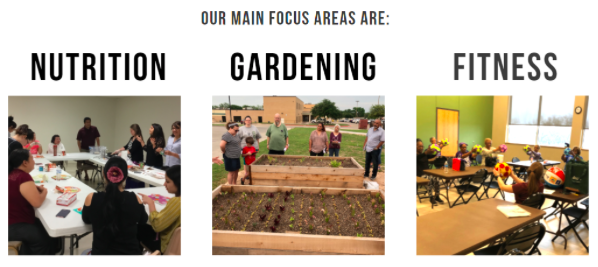By Anna Futral
November is National Adoption Month. CASA volunteers stay by a child’s side throughout the case, advocating first for reunification with the child’s parent(s) when safe and possible. If reunification is not safe or possible, CASA volunteers will advocate for the child to be adopted by, or live with, other relatives or family friends. If that is also not possible, CASA volunteers will work towards adoption by a non-relative.
Adoption is a beautiful thing, and just like any other major life decision, it’s not always easy. Some of our CASA staff have been through this journey to adopt. Here is our Executive Director, Anna Futral, and her family’s story.
In the summer of 2012, my husband, Trent, and I had been married four years, had the house, the cars, the jobs, and by all normal accounts, having a baby would be a next logical step in our life at that point. But we’ve never really followed convention, meanwhile, every time the baby conversation came up between us, we both ended up feeling somewhat ambivalent about it, like it wasn’t the answer for us, like there was a different plan in store for our hopes of building a family. Turns out…we were right.
Adoption had always been in the back of our minds. My husband and his sister were each adopted, so that has always been a piece of our puzzle. As baby conversations continued to stall out, we decided to be proactive and research, listen and learn, not knowing that this new path would take hold of us so quickly and so firmly. We heavily researched international adoption, domestic adoption, and that scary thing called foster care, initially setting it on the shelf as something for people more mature than us in our mid-20s, or at least who have some parenting experience. Taking care of a child and then possibly letting them go, abuse, neglect, court dates, birth parent visits, potential behavior and medical problems, social workers, therapists, so many unknowns…
Nevertheless, we sat down for a meeting with a foster care agency, thinking we were just gathering information. Afterwards, we got in my car and I turned it on but we didn’t go anywhere for a few minutes, even though we both needed to get back to work. He said “That felt really, really normal to sit there and talk about all that.” I said, “I know.” There was a strange mixture in our hearts and gut of both peace and fear, both “Yes, this is right” mixed with “You have got to be kidding me.” I stared wide eyed over the steering wheel with tears on my cheeks and Trent stared wide eyed at me. Then we went back to work.
Looking at the world around us, we see so much hurt and pain. We can look overseas at the extreme poverty, starvation and orphanage there. In the summer of 2012, we looked right out our door and realized there are children needing a home right in our own community. Without getting into a debate about which is more important (both are extremely important in our world), we decided that our hearts lie in our local community. So we jumped all in.
The next several years were intense yet exciting, complex yet contained some of the easiest and clearest decisions we’ve ever made. As we opened our home to two and then three children, we were surrounded by caring support and capable professionals. Though the details of our family’s story are our own, a winding path with many curveballs across several years culminated in our open adoption of three biological siblings.
Our family’s story is unique. Our family’s story is challenging. Our family’s story is precious.
We honor our children’s past, celebrate their present and eagerly anticipate their future. We have good times and we laugh so, so often. We work through life’s plain ole challenges as a plain ole family. We face confusion and questions about their tricky start in life when they rise up and we block out the rest of the world, plop down on the rug, hash through it all, say as many words and cry as many tears as we need to until we are as much at peace as we can be in that moment.
Being an adoptive family isn’t always easy. Turmoil pops up and trauma surfaces. Strangers make ignorant comments about our family and people assume things about our story that are entirely false. But we rally as their parents and circle around them. At times we will take the blows on their behalf and shield them entirely, other times we will jump down into the trench with them. Still other times we will sit back and cheer them on from afar as they live out their unique, challenging, precious story with strength, confidence and love.
To learn more about CASA’s work advocating for children in foster care please email [email protected] or call (254) 304-7982 or visit casaforeverychild.org.

Though born and raised in Fredericksburg, Anna Futral has called Waco home for sixteen years. She is a graduate of Baylor University, where she received her Bachelor of Business Administration in Accounting and a Master of Taxation. She built her career as a Certified Public Accountant at JRBT, where she worked for over ten years, specializing in service to nonprofit clients, prior to joining CASA of McLennan County in May of 2017. In addition to her business acumen and administrative leadership skills, Anna brings to CASA a deep-seated passion for children in foster care. She and her husband, Trent, are former foster parents and adopted their three children from foster care in 2016. When she’s not busy leading CASA forward or chasing her kids, ages 5, 6, and 7, Anna enjoys reading, spending time with good people, and working with her husband on their 120-year-old house in the heart of Waco.
By Paula Solano
Thanksgiving and fall festivities might look a bit different for most of us this year. When I think about the holidays, I think about food, fellowship, reflecting on the past year, and forward-thinking on years to follow.

Food is in the center of many cultures, in the center celebrations, those of joy and those of mourning. The types of foods we consume during the holidays also look different in many cultures.
Tamales are a Thanksgiving staple in our gatherings, along with our turkey, ham, and desserts. Nevertheless, this year we have the opportunity to make changes for health, wellness, and safety.
I look forward to this year’s holidays as a time to recharge and reflect. Our Thanksgiving celebration will be different as we will continue to practice social distancing, particularly thinking about our older adult loved ones and medically fragile friends. It is also a time of solidarity for those who have unexpectedly lost someone due to COVID-19.
This year, we will opt out of the large gatherings or travel and stay home. Nutrition and physical activity have gained substantial importance in our household and we hope to continue these practices as we prepare our Thanksgiving meal on a much smaller scale.
I’ve invested some time reviewing options to introduce to my picky eaters (my three children). I have had some successes and learned many lessons along the way. Particularly thinking about the cookie recipe I’ve included in this blog, a lesson learned from preparing the recipe is that I might have succeeded in sneaking cranberries had I pureed the cranberries. Needless to say, I considered this recipe a success when two-thirds of my kiddos gave the cookies a thumbs up.
Changing habits and behaviors can bring forth challenges; however, consistency is key. Health and wellness are at the forefront for many, and I personally hope our healthier choices will continue beyond this pandemic. Scaling back will be less complex as we face the possibility of preparing a smaller “feast.” Feeding a family of five will call for a smaller spread yet equally as cherished.
Our spread will likely includes cranberries. They are a seasonal fruit and can be found in the produce section, frozen, in a can, or as 100% juice.
Nutritional Facts and Health Claims
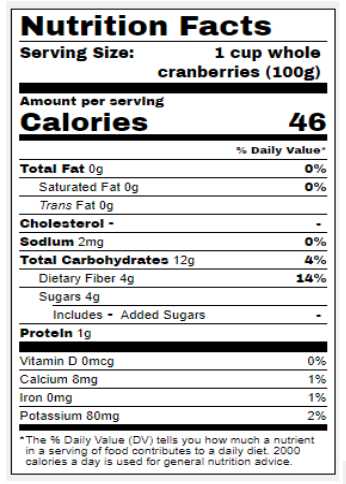
Did you know cranberries are a good source of antioxidants? One cup of whole cranberries contains 46 calories, calcium, iron, and potassium. Additionally, they’re sodium, cholesterol, and saturated fat free.
Cranberries offer unique health benefits, including potentially reducing the risk of high blood pressure when part of a low-sodium diet. Drinking cranberry juice can reduce the risk of UTIs.
Shopping & Storage
When shopping for fresh cranberries, select those that are firm to the touch. A single fresh cranberry will bounce if dropped on the floor. Avoid selecting cranberries that are soft or contain spots. Fresh cranberries may be refrigerated for up to two months, then, it is recommended that you freeze them.
Get the Facts!
Wash your hands as recommended by the CDC and clean contact surfaces often.
The U.S. Department of Agriculture MyPlate provides recipes, tips, and resources to guide you in creating a healthy eating plan. Start simple, download the MyPlate App, an easy-to-use app that will help guide you and track your progress.
Use:
OATMEAL CHOCOLATE CHUNK COOKIES

Prep Time: 10 minutes
Serving: 2.5 dozen cookies
Cook Time: 12 minutes
Ingredients
2/3 cup of butter or margarine, softened
2/3 cups of brown sugar
2 large eggs
1 1/2 cups of old-fashioned oats
1 1/2 cups of flour
1 teaspoon of baking soda
1/2 teaspoon of salt
1 6-once Ocean Spray ®Craisins Original Dried Cranberries
2/3 cup of white or semi-sweet chocolate chunk cookies
Directions
Preheat oven to 375F degrees.
Beat butter/margarine and sugar together in a medium mixing bowl until light and fluffy. Add eggs and mix well.
In a separate bowl, combine oats, flour, baking soda, and salt. Add to butter mixture in several additions, mix well after each addition. Stir dried cranberries and chocolate chunks.
Drop round teaspoonfuls onto an ungreased cookie sheet. Bake for 10-12 minutes or until golden brown. Cool on a wire rack.
Per serving: Cal. 130, Fat 6g (9%DV), Sat. Fat. 3.5g (18%DV), Sod. 90mg (4%DV), Carb. 18g (6% DV), Sugar 11g, Pro. 2g
CRANBERRY NUT BREAD

Prep Time: Approximately 1.5 hours
Servings: 15 portions
Cook Time: 50-60 minutes
Ingredients
2 cups of flour
2/3 cup sugar
1 1/2 teaspoon baking powder
1 1/2 teaspoon of baking soda
2 teaspoon grated orange peel
3/4 cup orange juice
4 tablespoon butter or margarine melted
1 egg or 2 egg whites (medium)
1 cup of chopped cranberries (I used a can)
1/3 cup chopped walnuts
1/3 powdered sugar (1/3 cup, optional, for glaze)
1 teaspoon of water (optional for glaze)
Directions
Preheat oven at 350F degrees. Mix flour, sugar, baking powder, and baking soda in a large bowl.
Grate orange peel, then squeeze juice from the orange. Add additional juice if needed to make 3/4 cup.
Blend orange juice, butter, egg, and grated orange peel in a separate bowl. Then add the flour mixture, stirring until blended, and add the cranberries and walnuts.
Pour batter into a 9-by-5-inch loaf pan, greased at the bottom.
Bake for 50-60 minutes or until a toothpick inserted in the center comes out clean. Cool in pan for 10 minutes.
Remove and cool completely in a wire rack.
Optional: To make the glaze, mix powdered sugar and water. Add water slowly to create a thin glaze, then drizzle over the cooled loaf.
Enjoy!

Paula Solano is a Master in Public Health student at Baylor University, certified Community Health Worker, volunteering at the Texas A&M AgriLife Extension Service. A Waco native, she is passionate about serving her community particularly underserved and underrepresented citizens.
Due to the continued spread of COVID-19 and the challenges it poses to communities across Texas, Texas A&M AgriLife Extension and many others continue to practice public health recommendations. Whether we are communicating online or face-to-face know that program content will always be research-backed to help individuals navigate decisions for themselves and their families. For information on resources, ideas, and programs for yourself and family visit Texas A&M AgriLife’s HUB. USDA is an equal opportunity provider and employer. This material was funded by USDA’s Supplemental Nutrition Assistance Program — SNAP. To learn more about the Supplemental Nutrition Assistance Program (SNAP) or to apply for benefits, visit YourTexasBenefits.com.
The Act Locally Waco blog publishes posts with a connection to these aspirations for Waco. If you are interested in writing for the Act Locally Waco Blog, please email [email protected] for more information.
by Anna Dunbar
America Recycles Day (ARD) has its 23rd anniversary this year. What many don’t know is that ARD has its roots in Texas, central Texas in fact. Texas Recycles Day began in 1994 as the idea of two Texas Commission on Environmental Quality employees, Kevin Tuerff and Valerie Davis. I had met them while I was at the agency and was always so impressed with their creativity. They came up with Texas Recycles Day to promote recycling on a day far enough away from Earth Day (April 22nd), but not before the Election Day in order to capture everyone’s attention. Thus November 15th was chosen as America Recycles Day!
Eventually, Texas Recycles Day was transformed into America Recycles Day. The first national America Recycles Day was held November 15th, 1997 and it has been celebrated annually ever since.
What about America Recycles Day in Waco? There is a lot of energy behind recycling in Waco. This year, the Waco Solid Waste Services is conducting a Scrap Tire Collection on Saturday, November 14. Here are the details:
- Location: 501 Schroeder Drive, near the Baylor Water Tower
- Hours: 7 AM until 12 Noon
- This event is for Waco residents only. Please pre-register or bring your Waco water utility bill as proof of residency.
- Restrictions:
- No more than 10 tires
- No tires from businesses
- No OTR, Skid Steer, Earth Movers
- Maximum size: 24 inches
- Maximum ten (10) tires per household
- Please preregister by calling (254) 299-2612
You might wonder why Waco Solid Waste Services is having a scrap tire collection at no extra charge. There are several reasons. First, recycling of scrap tires usually carries a fee per tire. The fee is waived during this event, making it easier for Wacoans to recycle their tires. Second, scrap tires are a breeding place for mosquitoes, which can carry diseases. Finally, scrap tires are prone to being dumped on vacant lots and other locations. This free collection is a good time to rid your property of scrap tires and recycle at the same time!
Waco Solid Waste Services encourages everyone to pre-register for this event and to wear a mask while talking with staff during the event. Pre-registration can be done by calling (254) 299-2612 Monday through Friday from 8 AM until 5 PM. Para informacion en Espanol: (254) 299-2612. There will also be a registration form at Waco-texas.com beginning November 5.
Thank you for keeping Waco Clean and Green!
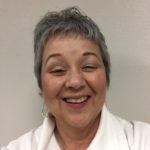
Anna Dunbar is the solid waste administrator for the City of Waco Solid Waste Services. She is responsible for informing Waco residents and businesses about recycling and waste reduction opportunities as well as solid waste services in Waco. Her husband is a Baylor professor and her daughter is a Baylor University alum who works at Horizon Environmental Services, Inc. Anna is an active member of Keep Waco Beautiful and The Central Texas Audubon Society.
The Act Locally Waco blog publishes posts with a connection to these aspirations for Waco. If you are interested in writing for the Act Locally Waco Blog, please email [email protected] for more information.
(City council, school board, planning commission, county commissioners – these groups and several others represent us. They do the day to day work of running our community. It is our responsibility to keep informed about their work so that we can help them represent us effectively. “Civic Insights” by Jeffrey Vitarius is a regular feature of Act Locally Waco. Its purpose is to help us understand decisions that shape our community so that we can participate effectively as informed, engaged residents of Waco. – ALW)

By Jeffrey Vitarius
This week we are going to try to unpack the following item from the November 3, 2020 City Council Agenda: “Consider a resolution approving an agreement with WBW Single Development Group, LLC – Series 110 for an Annexation Service Plan for certain properties described as 61.51 acres of land, more or less, situated in and being out of the B.B.B. & C. Railroad Company Survey, Abstract No. 157, McLennan County, Texas, and being a part of the called 194.45 acre tract of land described in a Deed to WBW Single Land Investment, LLC – Series 104, recorded in Document No. 2019028303 of the Official Public Records of McLennan County, Texas, and being located near the intersection of Warren Road and Ritchie Road and further located within Waco’s extraterritorial jurisdiction, which said territory lies adjacent to and adjoins the present boundary limits of the City of Waco, Texas”.
Whew! This is a long one, let’s jump right in.
What kind of agreement is the City approving with WBW SIngle Development Group, LLC – Series 110?
On July 29th, 2020 WBW Single Development Group, LLC – Series 110 (lets just call them WBW for now) requested that the City annex certain property they own. Annexation is the process by which a city adds bits of land to its jurisdiction and begins to collect taxes from and provide services to those areas. There are a number of different ways annexation can occur. This week there are three instances of property owners requesting annexation on the City Council agenda. This process of a property owner requesting annexation from a city is managed by the Local Government Code (in particular Chapter 43 deals with annexations and subchapter C-3 deals with this specific kind of annexation).
The code requires that the property owner and city come to a written agreement regarding services, an “Annexation Service Plan.” Approving this agreement is the specific action City Council took this week.
What is an “Annexation Service Plan”?
Chapter 43 makes this one fairly simple. An Annexation Service Plan needs to list the services the municipality will provide and identify when it will provide them. The Annexation Service Plan for this item can be found in this week’s meeting packet (packet pages 124-7). The plan is actually a pretty interesting way to look at the bare bones of what the city does. Here is a list of the services the plan identifies:
- Police Protection
- Fire Protection and Emergency Medical Services
- Solid Waste Collection
- Water Service
- Waste Water Service
- Capital Improvements (building infrastructure for the most part)
- Street Lights
- Traffic Control (things like traffic signs, and stop lights)
- Maintenance of Existing Roads & Streets
- Environmental Services
- Maintenance of Parks & Recreation Facilities
- Maintenance of Publicly Owned Facility, Building or Municipal Service
- Provision of Other City Services (libraries, animal control, code enforcement, etc)
- Election Voting Services
This is almost a social contract in its most basic form. A property owner is agreeing to join the city and take on both the responsibility of paying its property taxes and abiding by its ordinances and the services the city agrees to provide. Additionally, this list makes clear just how often the citizens of Waco are impacted by the city. Driving to work involves city maintained roads and traffic signals. Watering lawns involve city water delivered through city pipes.
What does all that after “more or less, situated in” mean?
This section of the item lays out where the land being considered is located. The meeting packet includes a map as well (included below) on packet page 123, but this language is a general legal description of where the land is located. The item also includes a survey (on packet pages 130-1) that lays out even more detail regarding the exact parameters of the land being considered.
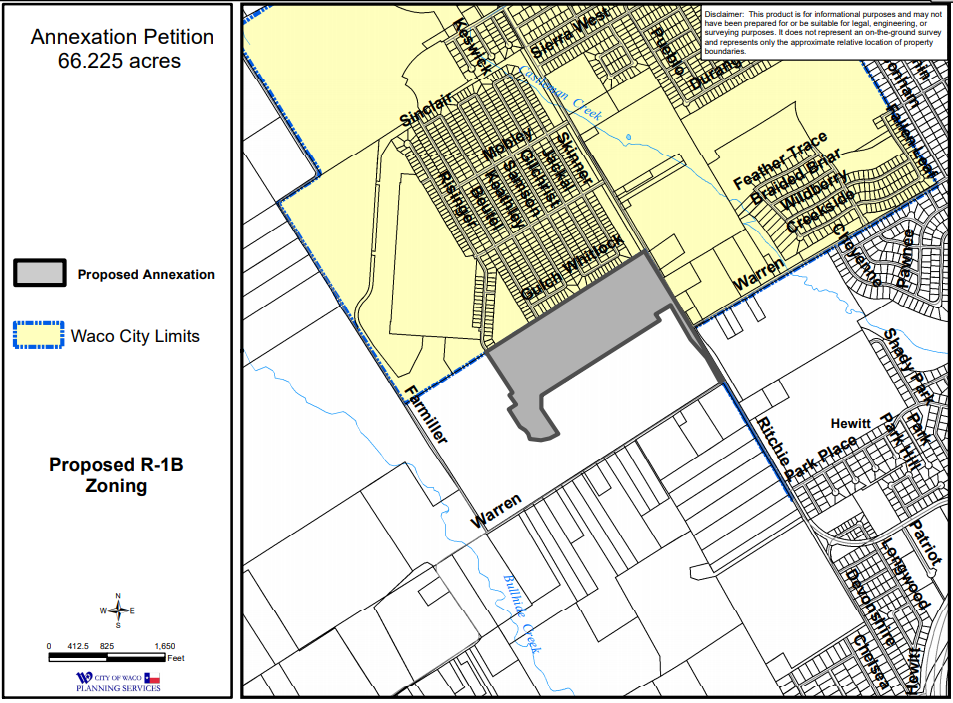
Why does the item mention Waco’s extraterritorial jurisdiction (ETJ)?
One of the requirements for annexation is that the land lay in the ETJ.
So, let’s go back to the initial sentence. We can now summarize it to mean: consider approving an agreement with a property owner to begin providing city services to a property described as x that is within Waco’s ETJ.
What comes next?
- November 17th – Public Hearing and First Reading/Vote
- December 1st – Second Reading/Vote
Other Interesting Items From the Agenda (to me)
- Impact fees are back for their second reading. There is also a work session item regarding how they could be changed in the future. This was one of the bigger questions Council member Holmes had two weeks ago.
- There are three Annexation Service Plans up for consideration. All in all they represent about 290 acres. The second and third of these plans are with the Waco Industrial Foundation which is an interesting topic for a different time.
- There are two resolutions and one ordinance related to Boards and Commissions. The resolutions are general and deal with approving appointments and clarifying certain language around advisory boards. The ordinance deals specifically with the Sustainable Resource Practices Advisory Board adjusting its mission, purpose, and membership.
Meeting Basics
- City Council meets on the first and third Tuesdays of every month.Work Session – 3:00 pm / Business Session – 6:00pm
- To watch the recorded session click here (City of Waco Cable Channel, wccc.tv)
- For the full agenda click here
- For the meeting packet with the documents pertinent to the meeting click here.

Jeffrey Vitarius has been actively local since early 2017. He lives in Sanger Heights with partner (JD) and his son (Callahan). He helped found Waco Pride Network and now serves as that organization’s treasurer and Pride Planning Chair. Jeffrey works at City Center Waco where he helps keep Downtown Waco clean, safe, and vibrant. He is a member of St. Alban’s Episcopal Church and graduated from Baylor in 2011.
The Act Locally Waco blog publishes posts with a connection to these aspirations for Waco. If you are interested in writing for the Act Locally Waco Blog, please email [email protected]for more information.
It’s You – the people of Waco – that make Waco a terrific place to live! You are the not-so-secret ingredient that’s making Waco better and better. Our job at Act Locally Waco is to help you do that! Will you help us help you?
Every Friday Act Locally Waco pumps out the information you need to stay involved and engaged in Waco. It’s all there in our free weekly e-newsletter, The WHOLE Enchilada. November is “subscription drive month” for The WHOLE Enchilada. Will you help us grow? We are asking all friends of Act Locally Waco to basically do two things: 1. Subscribe yourself (if you haven’t already), and 2. Encourage your friends to do the same!
Since 2013, The Act Locally Waco weekly newsletter – The WHOLE Enchilada — has been providing engaged Wacoans (That’s You again!) with the information you need to enjoy Waco and get involved in building up your community.
Here are a few examples of the kinds of information we have gathered for you from the last few weeks:
- Statements from the mayor/city council candidates to help you understand how they would approach the job if elected
- A “plain English” translation of the “impact fee” proposal– an important, but complicated issue for the future of Waco that City Council has been working on for years.
- An introduction to Tiffany Gallegos Whitley who will be leading the new “Upskill Waco” workforce initiative at Prosper Waco.
- Updates on Meals and Wheels, Caritas, Christian Women’s Job Corps and other non-profits. Information to keep you informed about what’s happening with them and how you can help.
- Events from the YMCA, the Centex Hispanic Chamber of Commerce, Grassroots Waco, the Mayborn Museum, Keep Waco Beautiful, Creative Waco, McLennan County Community College and countless others so you can plan your weeks and days.
- Job opportunities for example at the COVE and the Salvation Army among others.
And that’s just a taste of what you find in The WHOLE Enchilada each week. It is truly full to the edge of the plate with Waco goodness, plus – it’s free!
We currently have 3,111 subscribers, and our goal is to add 1,000 more. Imagine the benefit to Waco of 1,000 more involved, engaged people!
If you are a social media follower, but you haven’t subscribed yet, go ahead and sign up! Our current subscribers love the convenience of having everything pulled together each week and delivered to their email. If you are already a subscriber, please help us out by sharing The WHOLE Enchilada with 2 or 3 (or 10!) friends each week during November, and encouraging them to subscribe. We’ll be posting the subscription link regularly on Facebook during November – so please share that as well.
Whether it’s patronizing an art opening, volunteering to help a child in the foster system, participating in an online auction for a local cause you care about, or finding out about opportunities to pick up litter – The WHOLE Enchilada makes it easy for you to stay informed so you can get involved. Subscribe today! Help us grow!
“Act Locally Waco has been a really successful resource for us. Ashley Bean Thornton and all the people at Act Locally Waco have been willing to share all the things that we do around Waco to try and make it better. ” — Ashley Millerd Crownover, Keep Waco Beautiful
“Just about everything I’ve learned about Waco, aside from the Silos and Baylor, I’ve learned from Act Locally Waco!” — Ferrell Foster, brand new Waco resident
“By subscribing to Act Locally Waco, I am always in the know of things that are happening within our community and amongst my neighbors.” — Cuevas Peacock, community volunteer and cheerleader
“The Whole Enchilada is one of my weekly favorites. As both a subscriber and a contributor, I feel equally blessed by the efforts that Ashley and her team put forth in bringing such vital and unifying information to our community. Act Locally Waco and The Whole Enchilada are two of my favorite go-to sources for what’s new and happening in our community and how we are growing together to make Waco a great place to live for everyone!” — Lydia Tate, Christian Women’s Job Corps
.
By Lindsey Breunig-Rodriguez
Every year we like to provide program updates and share new curriculum. Do not worry, next month we will back to regular scheduled fruit and veggie facts.
Greetings from the McLennan County Texas A&M AgriLife Extension Service! My name is Lindsey, and I am the Extension agent for the Better Living for Texans (BLT) Program. BLT is a nutrition education program for adults and youth who are SNAP participants or SNAP eligible, and in October we kicked off our 26th year of serving Texans.
Programs are free and rooted in research. Evidence-based information empower individuals, families, and communities to make positive changes for healthier lives. Whether we meet in-person, online, virtually, or through a combination of methods, we are here to serve you. This monthly update will feature our available curriculum. You will see that BLT is for all Texans.
Curriculum Highlights:
FOCUS: NUTRITION
A Fresh Start to a Healthier You! – Target Audience: Adults
Promotes increasing fruit and vegetable intake, food safety, and food resource management.
A Fresh Start to a Healthier You! – ONLINE – Target Audience: Adults
Promotes increasing fruit and vegetable intake, food safety, and food resource management.
Conducted completely online.
Get the Facts – Target Audience: Adults
Teaches how to read Nutrition Facts Labels and identify portion sizes, sodium, fat, and added sugar found in foods.
Healthier Carbohydrates -Target Audience: Adults
Promotes a healthful eating pattern to prevent or delay diet related chronic diseases
Be Well, Live Well – Target Audience: Older Adults
Promotes nutrition and physical activity specifically targeting older adults
Color Me Healthy – Target Audience: Preschoolers and Kindergarteners
Provides fun, innovative, interactive learning opportunities on physical activity and healthy eating.
Balancing Food & Play – Target Audience: 3rd-5th graders
Promotes good nutrition and healthy weight; physical activity; limiting screen time; increase fruit and vegetable intake; drinking milk with meals and water with snacks.
Choose Healthy – Target Audience: Middle Schoolers
Teaches about MyPlate, physical activity (energy balance), making healthy food choices, and choosing healthy drinks.
FOCUS: GARDENING
Growing and Nourishing Healthy Communities – Target Audience: Adults
Teaches how to build gardens and grow fresh vegetables.
Learn, Grow, Eat and GO! – Target Audience: 3rd-5th graders
Enhances gardening skills and increased fruit and vegetable intake
FOCUS: PHYSICAL ACTIVITY
Walk Across Texas! (WAT!) – Target Audience: all ages
Promotes increased physical activity through tracking miles walked
Walk N Talk – Target Audience: all ages
Promotes increased physical activity – WAT! with added nutrition messages in a discussion format. Discussion topics are: 1. Fruits and Vegetables, 2. Rethink Your Drink! (hydration, flavored waters, sugary drinks, etc.)
If you have questions, want to plan and brainstorm, or want to hear more, please reach out to Lindsey at McLennan County’s Texas A&M AgriLife Extension office:
Phone, 254-757-5180 or email, [email protected]
Due to the continued spread of COVID-19 and the challenges it poses to communities across Texas, Texas A&M AgriLife Extension and many others continue to practice public health recommendations. Whether we are communicating online or face-to-face know that program content will always be research-backed to help individuals navigate decisions for themselves and their families. For information on resources, ideas, and programs for yourself and family visit Texas A&M AgriLife’s HUB.
USDA is an equal opportunity provider and employer. This material was funded by USDA’s Supplemental Nutrition Assistance Program — SNAP. To learn more about the Supplemental Nutrition Assistance Program (SNAP) or to apply for benefits, visit www.yourtexasbenefits.com

Lindsey Breunig-Rodriguez is an Extension Agent for the Better Living for Texans program with the Texas A&M AgriLife Extension Service. She is originally from Grapevine but now calls Waco home. A graduate from Baylor University, she loves to venture out to Cameron Park, visit the local Farmers Market, and try out the awesome eateries in Waco. If you see her and hear a loud bark, that’s her pup Lucy Ann just saying hello.
The Act Locally Waco blog publishes posts with a connection to these aspirations for Waco. If you are interested in writing for the Act Locally Waco Blog, please email [email protected] for more information.
By Becca Muncy
With just a few days until Election Day, tensions may be running high around you. A new study from the American Psychological Association found that 68% of American adults, across all political affiliations, say that the election is a significant source of stress in their lives. So, if this election season has you feeling anxious, frustrated, or burnt out, you’re not alone. Here are some ways to manage election stress and fatigue now and on November 3:
- Set boundaries for yourself. Randal Boldt, Senior Associate Director, Training Director & Supervising Psychologist at the Baylor Counseling Center, says that the most important thing you can do to manage election stress is set boundaries. He says that, “caring about political outcomes is a healthy part of supporting a society,” but acknowledges that, “it can also be overwhelming at times.” Setting boundaries, like limiting your news consumption on Election Day, can help you from getting too overwhelmed.
- Find good news. In addition to setting boundaries around news consumption, seeking out good news can help, too. During an election season, it can seem like all the news is negative, inflammatory, or frustrating. Keeping up with current events is a good thing, but counterbalancing negative election news with inspiring and positive news might help keep you from getting too overwhelmed. Need help finding good news? Take a look at UC Berkeley’s Greater Good Magazine or the Solutions Journalism Network, or follow accounts like @goodnews_movement on social media.
No matter the outcome of the election, at least some people are going to experience disappointment if their chosen candidate loses the presidential race. And even if you are the coolest, calmest, and most collected you’ve ever been on Election Day, you can still feel grief over your candidate losing. Here are some ways to handle those negative feelings:
- Remember that disappointment is a normal thing. Boldt says acknowledging and facing your grief is important. This year may feel particularly stressful and the election may seem extra divisive, but remember that disappointment and grief are normal parts of life, no matter the circumstances. Acknowledging and naming your feelings of grief or disappointment is the first step of healing.
- Take a break or talk to someone. Allow yourself a break from your normal tasks, as you would if you were grieving anything else. Before Election Day, find a trusted person you can talk to and process your feelings with in case things don’t go your way.
- Find a way to move forward. Boldt says channeling your disappointment into action can be helpful. “Feelings of helplessness can be overwhelming, but after some healthy grieving… putting your emotion and energy into changing the future can be very healing.” Remember that there are still ways you can help those in your community, regardless of who is commander in chief.
Even if you are unhappy about the outcome of the election, that doesn’t diminish the fact that you participated and did your part to make your community better. Plus, the great thing about the U.S. election cycle is that you’ll have many more opportunities to participate in elections. From national to state to local government, from primaries to midterms and everything in between – there’s always next year!

Becca Muncy is an Act Locally intern from Dallas. She is studying professional writing at Baylor University and is completing her senior year.
The Act Locally Waco blog publishes posts with a connection to these aspirations for Waco. If you are interested in writing for the Act Locally Waco Blog, please email [email protected]for more information.
(City council, school board, planning commission, county commissioners – these groups and several others represent us. They do the day to day work of running our community. It is our responsibility to keep informed about their work so that we can help them represent us effectively. “Civic Insights” by Jeffrey Vitarius is a regular feature of Act Locally Waco. Its purpose is to help us understand decisions that shape our community so that we can participate effectively as informed, engaged residents of Waco. – ALW)

By Jeffrey Vitarius
We are finally coming to the end of the long impact fee process. This policy has been a goal of the city since it adopted the comprehensive twenty-five year plan in 2016. There has been intense study and discussion of the potential policy since Freese and Nichols (consulting firm) was hired to produce the study back in December of 2018. We have been writing about it here since early September. Last week, the City Council took its first vote on the initial policy that has been generated by this process. Another vote is scheduled for next Tuesday (November 6th) and this should be the final step.
Back in September, we started this discussion with a broad look at what an impact fee policy is. We moved from there to the legal process for establishing an impact fee, and finally to an examination of the pipe-related and road-related details of the Freese and Nichols report . That report will serve as the basis for any impact fee policy in Waco. Here in our final post, we will finally move from what impact fees could be to what they should be by examining the policy that was approved last week and the discussion that has occurred at the City Council level regarding how best to proceed.
The Policy
As a brief reminder, the Freese and Nichols report established the maximum allowable impact fees for water, wastewater, and roadways (the end of the could process). The results of that study are below.
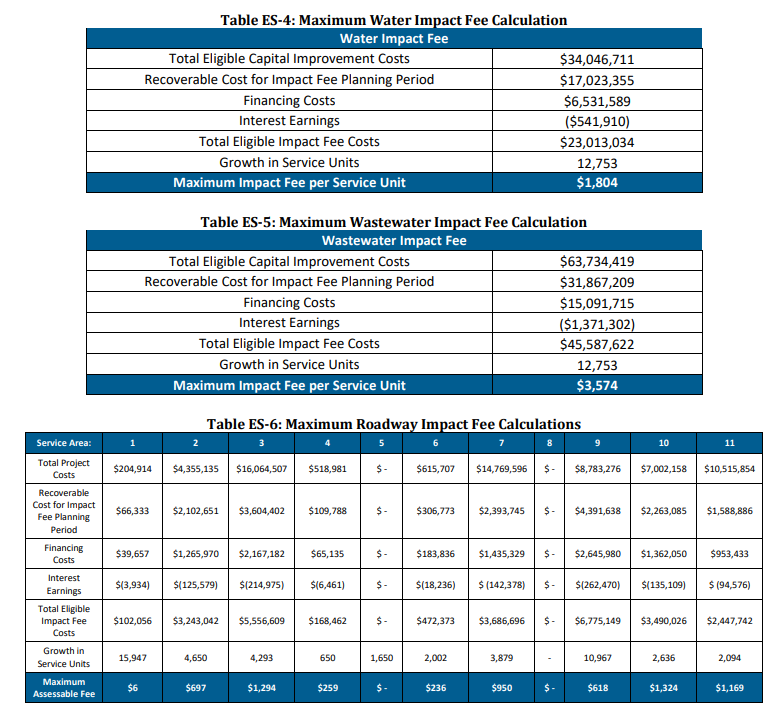
All of these maximums are based upon single-family home equivalency. So, the numbers above are the maximum allowable impact fees for a single-family home. For example, a single-family home in service area seven (near China Spring) could not have an impact fee above $6,328 ($1,804 – water + $3,574 – wastewater + $950 – roadway). Developments that are not made up of single-family homes have a maximum that is scaled based on calculations of use. So if a development is anticipated to use twice as much of the infrastructure as a single-family home, the maximum impact fee for that development is twice that of the single-family home (there is a lot more detail on this front in the last two posts).
The policy the city is in the process of adopting (found in more detailed form in the ordinance that was voted on last week) starts with base impact fees that are 100% of the allowable fees established above. However, to this base fee a number of exemptions, waivers, and limits are applied.
Below is a brief list of most but not all of these adjustments with some explanation of each:
- Residential Infill Waiver – single family homes in the “residential infill area” (map below) would have all impact fees waived
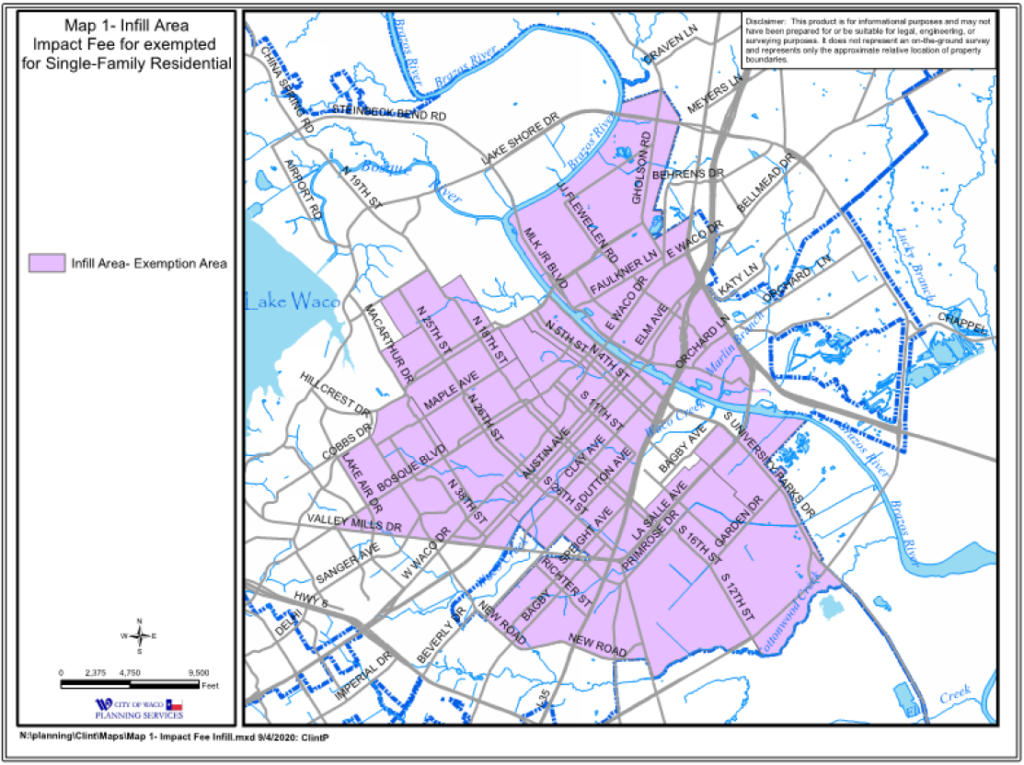
- Traditional Commercial Corridor Credit – non-single family home developments in the “traditional commercial corridor area” (map below) would have impact fees reduced by 50%
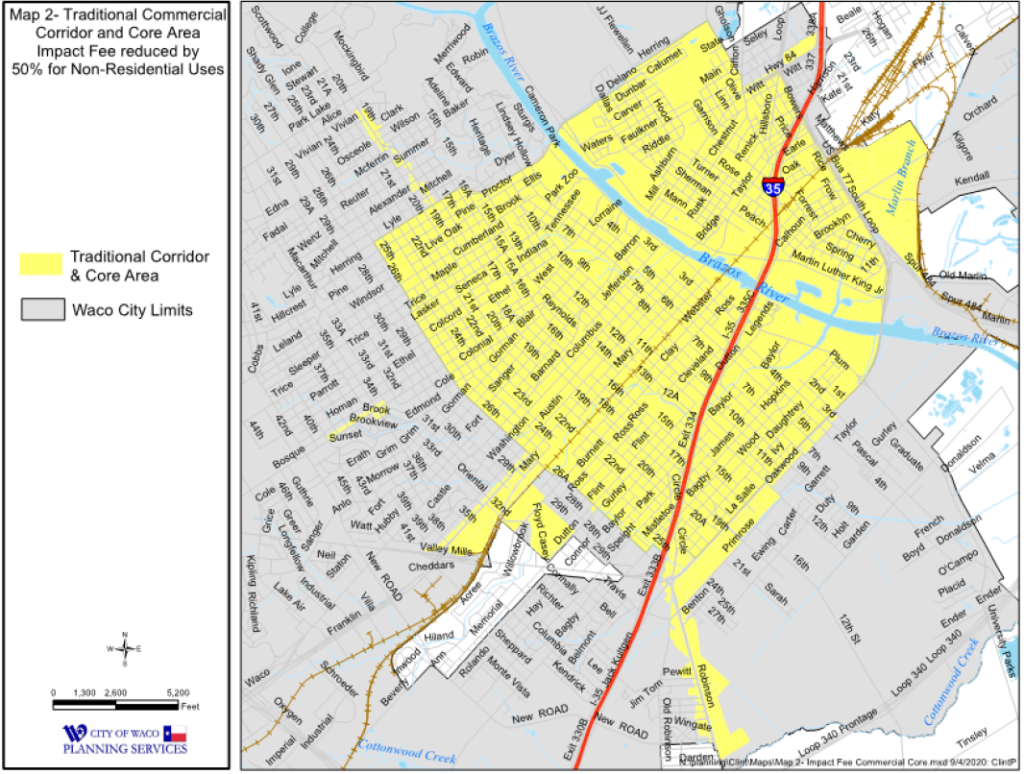
- Credits for construction of system-wide facilities – from a really broad view, if the development involves the construction of system-wide facilities (those kinds of infrastructure that are not just for the development itself) a credit to account for this construction would be applied to impact fees
- Affordable Housing Waiver – if a development has at least 25% affordable housing units (costing less than 30% of a household’s income for households making less than 80% of Waco’s median income) and an additional 25% that are either affordable or “workforce” units (costing less than 30% of a household’s income for households making between 80%-120% of Waco’s median income) impact fees would be waived. There are additional allowances for +sale units as well. Eagle eyed observers may spot that some of these percentages have appeared before in discussions of the CDBG program.
- Existing Business Waiver – if an existing business expands or relocates and the project fits with a collection of conditions (for example being open at least 2 years already, and documentations showing that the expansion or relocation will provide at least as many jobs as before) all impact fees would be waived.
- Phase-in elements – the policy has an effective date of June 1st, 2021. The fees would also be phased in over the course of five years (hitting 100% in June of 2024). There is also a waiver that would apply to projects that are nearly complete.
Each of these policy adjustments has some reasoning behind it and in most cases represents an effort to avoid disincentivizing certain kinds of development. It’s economics short-hand to say that if you make something more expensive you will get less of it (like most economics, I am sure there are disputes on this point, but the general rule remains). If affordable housing became more expensive to build due to impact fees, the theory goes that some number of units would not be built because of the increased cost. So, the above adjustments tend to exempt or reduce impact fees for the kinds of development that are high priorities for the city (infill residential, core commercial, affordable housing, etc). In addition to these adjustments, the policy gives the city the ability to grant waivers on a case by case basis as well.
The phase-in elements provide developers with some time to incorporate the new impact fees into their calculations and decision making.
The downside to these adjustments is that they make a complicated policy more complicated. Much of the discussion at City Council hit upon this point.
The Discussion
Over the course of the last two City Council meetings (10/06 and 10/20) there has been substantial discussion of the policy outlined above. In general, there has been support for impact fees in theory. Most points of concern have been focused on the specifics of the policy and its timeline for implementation.
The committee formed to analyze and make recommendations on the impact fee policy (the Capital Improvements Advisory Committee – CIAC) recommended the above policy with a single exception: that the implementation of commercial impact fees be delayed for six months (essentially pushing the effective date of commercial impact fees from June 1st, 2021 to December 1st, 2021).
This recommendation exception highlights one of the key elements of the discussion around this policy. The commercial impact fee calculation is substantially more complicated than the residential impact fee calculation. This makes sense, given the variety of developments that fit under the “commercial” umbrella. For commercial developments, the variety of kinds, sizes, locations, and exemptions all factor into the impact fee calculation. The city is working on a calculator to assist developers in navigating the detailed points of this part of the policy.
Additionally, concerns were focused on whether this policy strikes the right balance between funding the needed infrastructure projects and making sure not to disincentivize development. Since this policy is new, there were also questions about when and how it could be changed.
Input that was received from the public raised similar concerns and questions regarding balance and alternatives.
Arguments were made that the substantial phase-in elements of the policy and semi-annual review by the CIAC allowed for adjustment before the full impact of the fees would be felt by developers. Additionally, the importance of associating the costs of development with development rather than existing tax and ratepayers was emphasized. Ultimately the City Council voted 5-1 to approve the policy in its first vote. The Council will vote for a second and final time next Tuesday.
Thank you for walking through this review of impact fees with me. I hope to bring you something new or at least different in November. If there are any particular civic policy or issues you would like me to take more of a look at, please feel free to comment here. Thanks again.

Jeffrey Vitarius has been actively local since early 2017. He lives in Sanger Heights with partner (JD) and his son (Callahan). He helped found Waco Pride Network and now serves as that organization’s treasurer and Pride Planning Chair. Jeffrey works at City Center Waco where he helps keep Downtown Waco clean, safe, and vibrant. He is a member of St. Alban’s Episcopal Church and graduated from Baylor in 2011.
The Act Locally Waco blog publishes posts with a connection to these aspirations for Waco. If you are interested in writing for the Act Locally Waco Blog, please email [email protected]for more information.

By Jo Welter

Although members of the Baha’I Faith all across the United States have been working at and toward race unity for well over 100 years, even including the small Baha’i community here in Waco, Texas. There are clearly certain times when people are more open to racial issues and recognizing we must do something to unite. And although there have been an endless and varied number of examples of continuous and ongoing oppression pervading every aspect of our society, it seems the murder of George Floyd and immediate subsequent killings of other African Americans has struck the right chord in people of all colors and backgrounds to focus on this issue.
The Baha’i writings state, “The well-being of mankind, its peace and security, are unattainable unless and until its unity is firmly established,” and “The best-beloved of all things in My sight is justice.” Our unity is predicated upon justice and equity for all human beings.
Justice, equity and the essential oneness of all humanity are principles that are dear to the hearts of members of the Baha’i Faith since The Baha’i teachings revolve around the oneness of humanity, with laws and precepts regarding creating unity or eliminating barriers to unity.
Barriers to our unity vary world-wide, but Baha’is understand that in this country the biggest obstacle to justice and unity is that of racism.
There is no scientific or spiritual basis for the idea of race. Race is a made-up construct invented by man to divide and separate us in order to maintain power and satisfy greed. This is the time when we can commit, as individuals and as a national community, to working tirelessly at justice and unity. This is an effort that will take commitment on the part of every person, institution and entity through genuine relationships, understanding and thoughtful wisdom in our commitment to each other and to the betterment of our community.
In the middle of this month’s Anchor News, readers will find a letter from the National Spiritual Assembly of the Baha’is of the United States regarding race and racism and our commitment to seizing this opportunity and openness to working toward justice, equity and unity. We invite you to read this carefully to understand where the Baha’is stand, why and how we work toward justice and unity.
Whatever your faith or background, the Waco Baha’is invite you to a Zoom gathering to explore together our shared commitment to achieving justice, equity and unity Friday evening, October 30 at 7 pm. If you would like to participate in the discussion, email [email protected].

This article was originally published in the October 2020 issue of The Anchor News. The Anchor News is a free, monthly publication of Crawford Publishing. The Anchor News is dedicated to serving the community and surrounding area, focusing on positive news and accomplishments of minorities. For more information about The Anchor News including how to subscribe or where to pick up a copy, please visit The Anchor News website.
By Ferrell Foster
WACO — Prosper Waco has begun an effort called UpSkill Waco to promote coordination of workforce initiatives in Greater Waco and to provide scholarship funding for residents, particularly those impacted by COVID-19, to gain needed training or re-skilling for high-demand occupations.
Cooper Foundation is funding the effort, which will be led by Tiffany Gallegos Whitley, Prosper Waco’s new director of workforce initiatives. She will continue in her role as chair of Waco Employer Resource Network (WERN), a working group of higher education, community organizations, and employers involved in workforce development and employee retention.
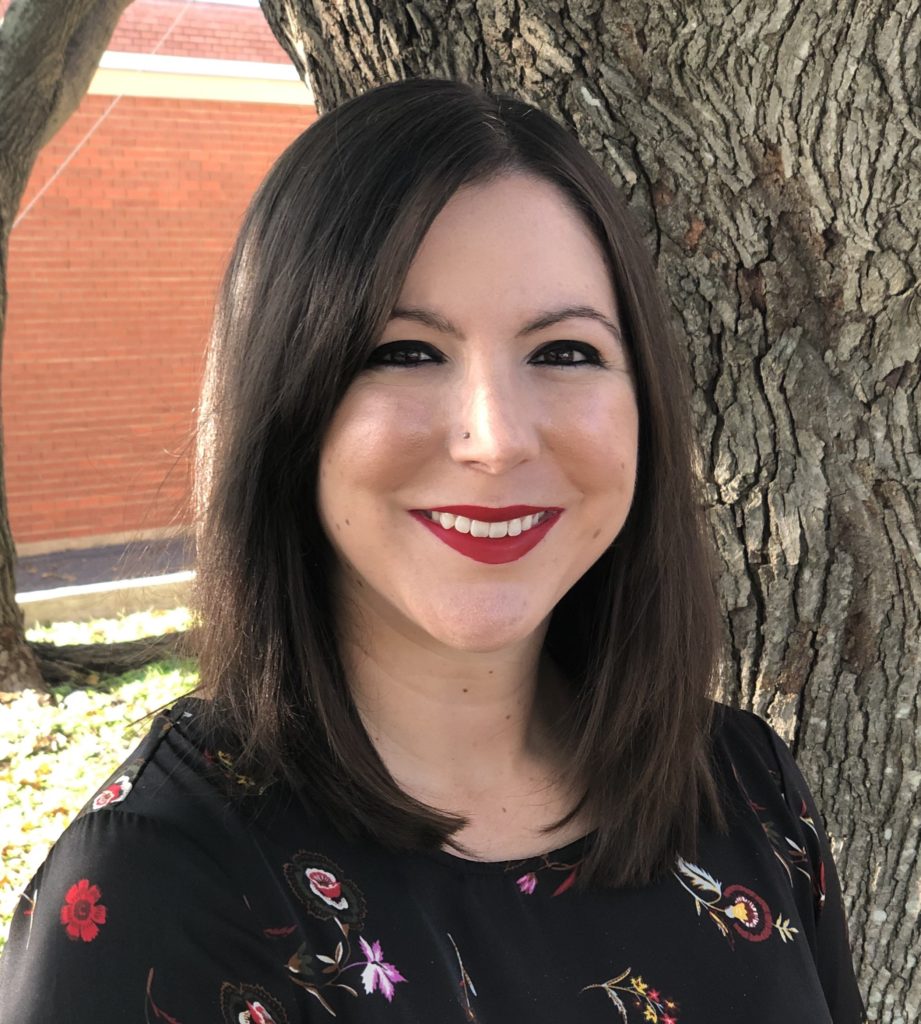
The goal of UpSkill Waco is to train local residents to improve their work skills in a manner that matches local job needs and to do so using a cost-effective model.
“Working toward this goal takes coordination,” said Hermann Pereira, Prosper Waco’s senior education and workforce specialist. “Prosper Waco has met with City Council members, existing leaders of businesses in five sectors, the three Chambers of Commerce, instructors from MCC & TSTC training programs in five areas, Goodwill industries, City of Waco services and local organizers with roots in neighborhoods. Prosper Waco has gotten commitment from these entities to create an aligned system of services to provide workforce training at a reasonable cost for Waco.”
Gallegos Whitley said the initiative is particularly focused on persons about age 18-24 who have a high school diploma but no post-high school education or training. Unemployment rates are highest among this group, she said.
“My role was created to coordinate multiple stakeholders across the city and county to move the needle on workforce initiatives,” said Gallegos Whitley. The effort will focus on increasing the capacity of current workforce training, filling gaps in training, and providing equitable career paths to help people move into family-sustaining careers.
Prosper Waco CEO Suzii Paynter March said: “Successful workforce initiatives are based on education, training, and relevance to industry needs. Tiffany and Hermann are a talented staff team combining strengths in education and workforce success. Waco will benefit from the teamwork.”
Cooper Foundation Executive Director Felicia Goodman said: “Cooper Foundation is committed to making Waco a better and more desirable community in which to live. An important part of any healthy community is having job opportunities and trained persons to serve in those jobs. This workforce initiative will help both the people and businesses of Waco.”
The project is yet another outgrowth of the 2014 Upjohn economic development plan presented to the city. “We are building off of the Upjohn report and going beyond,” said Gallegos Whitley. “We are staying current with new data.”
“Upjohn has influenced all that we have done with workforce development in recent years, giving us a north star to guide our efforts,” Pereira said. “In this newest stage we are investing in the goals of other organizations involved in the effort.”
Gallegos Whitley has called Waco home for the past 12 years. She is a two-time Baylor University graduate, receiving a bachelor’s degree in international studies and a Master of Social Work degree. Between undergraduate studies and graduate school, Gallegos Whitley worked with the Texas Hunger Initiative, helping communities organize around food security issues. She became passionate about community development and decided to root herself in Waco.
Prior to joining Prosper Waco, Gallegos Whitley worked 5½ years with Heart of Texas Goodwill Industries, where she oversaw building strategic community and business partnerships to further Goodwill’s job training and education programs. During her time at Goodwill, she also helped implement the Waco Employer Resource Network, a national model of skills training and job retention for incumbent workers.
In her role with Prosper Waco, Gallegos Whitley will oversee workforce projects that bring together key stakeholders to collaborate and continue building equitable training and career pathways for all McLennan County residents.
Ferrell Foster is senior content specialist for care and communication with Prosper Waco.

